Assessment, Formulation & Management of Care - Care Plan for Stephen
VerifiedAdded on 2023/04/08
|8
|1319
|56
AI Summary
This document provides a care plan for Stephen, a patient with mental illness. The care plan focuses on addressing his psychological needs, such as hallucinations and false beliefs, and includes interventions such as involvement in distracting activities, communication with mental health nurses, and pharmacological interventions. The plan also includes evaluation and rationale for each intervention. The goal is to improve Stephen's sleep and overall mental health.
Contribute Materials
Your contribution can guide someone’s learning journey. Share your
documents today.
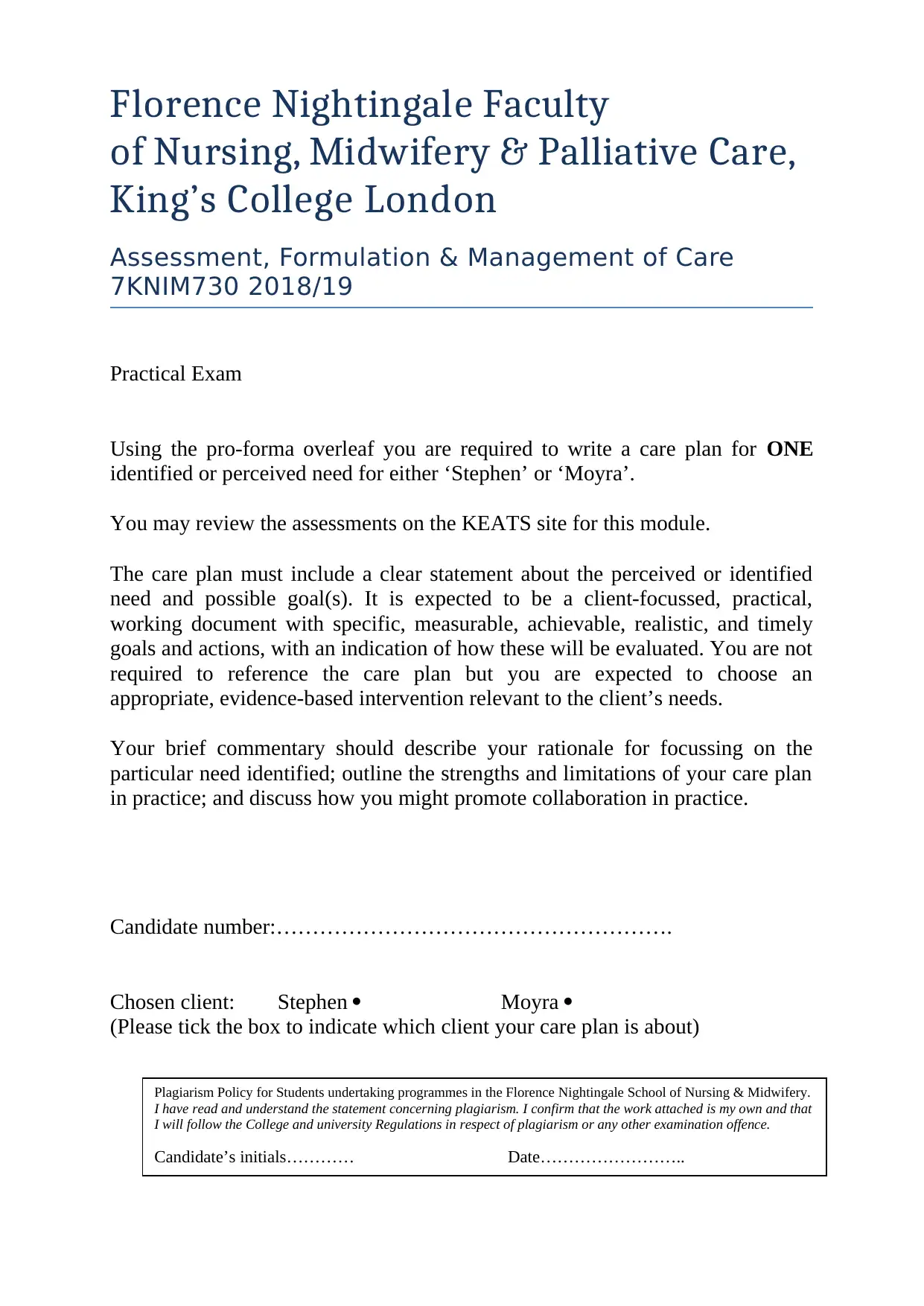
Florence Nightingale Faculty
of Nursing, Midwifery & Palliative Care,
King’s College London
Assessment, Formulation & Management of Care
7KNIM730 2018/19
Practical Exam
Using the pro-forma overleaf you are required to write a care plan for ONE
identified or perceived need for either ‘Stephen’ or ‘Moyra’.
You may review the assessments on the KEATS site for this module.
The care plan must include a clear statement about the perceived or identified
need and possible goal(s). It is expected to be a client-focussed, practical,
working document with specific, measurable, achievable, realistic, and timely
goals and actions, with an indication of how these will be evaluated. You are not
required to reference the care plan but you are expected to choose an
appropriate, evidence-based intervention relevant to the client’s needs.
Your brief commentary should describe your rationale for focussing on the
particular need identified; outline the strengths and limitations of your care plan
in practice; and discuss how you might promote collaboration in practice.
Candidate number:……………………………………………….
Chosen client: Stephen Moyra
(Please tick the box to indicate which client your care plan is about)
Plagiarism Policy for Students undertaking programmes in the Florence Nightingale School of Nursing & Midwifery.
I have read and understand the statement concerning plagiarism. I confirm that the work attached is my own and that
I will follow the College and university Regulations in respect of plagiarism or any other examination offence.
Candidate’s initials………… Date……………………..
of Nursing, Midwifery & Palliative Care,
King’s College London
Assessment, Formulation & Management of Care
7KNIM730 2018/19
Practical Exam
Using the pro-forma overleaf you are required to write a care plan for ONE
identified or perceived need for either ‘Stephen’ or ‘Moyra’.
You may review the assessments on the KEATS site for this module.
The care plan must include a clear statement about the perceived or identified
need and possible goal(s). It is expected to be a client-focussed, practical,
working document with specific, measurable, achievable, realistic, and timely
goals and actions, with an indication of how these will be evaluated. You are not
required to reference the care plan but you are expected to choose an
appropriate, evidence-based intervention relevant to the client’s needs.
Your brief commentary should describe your rationale for focussing on the
particular need identified; outline the strengths and limitations of your care plan
in practice; and discuss how you might promote collaboration in practice.
Candidate number:……………………………………………….
Chosen client: Stephen Moyra
(Please tick the box to indicate which client your care plan is about)
Plagiarism Policy for Students undertaking programmes in the Florence Nightingale School of Nursing & Midwifery.
I have read and understand the statement concerning plagiarism. I confirm that the work attached is my own and that
I will follow the College and university Regulations in respect of plagiarism or any other examination offence.
Candidate’s initials………… Date……………………..
Secure Best Marks with AI Grader
Need help grading? Try our AI Grader for instant feedback on your assignments.
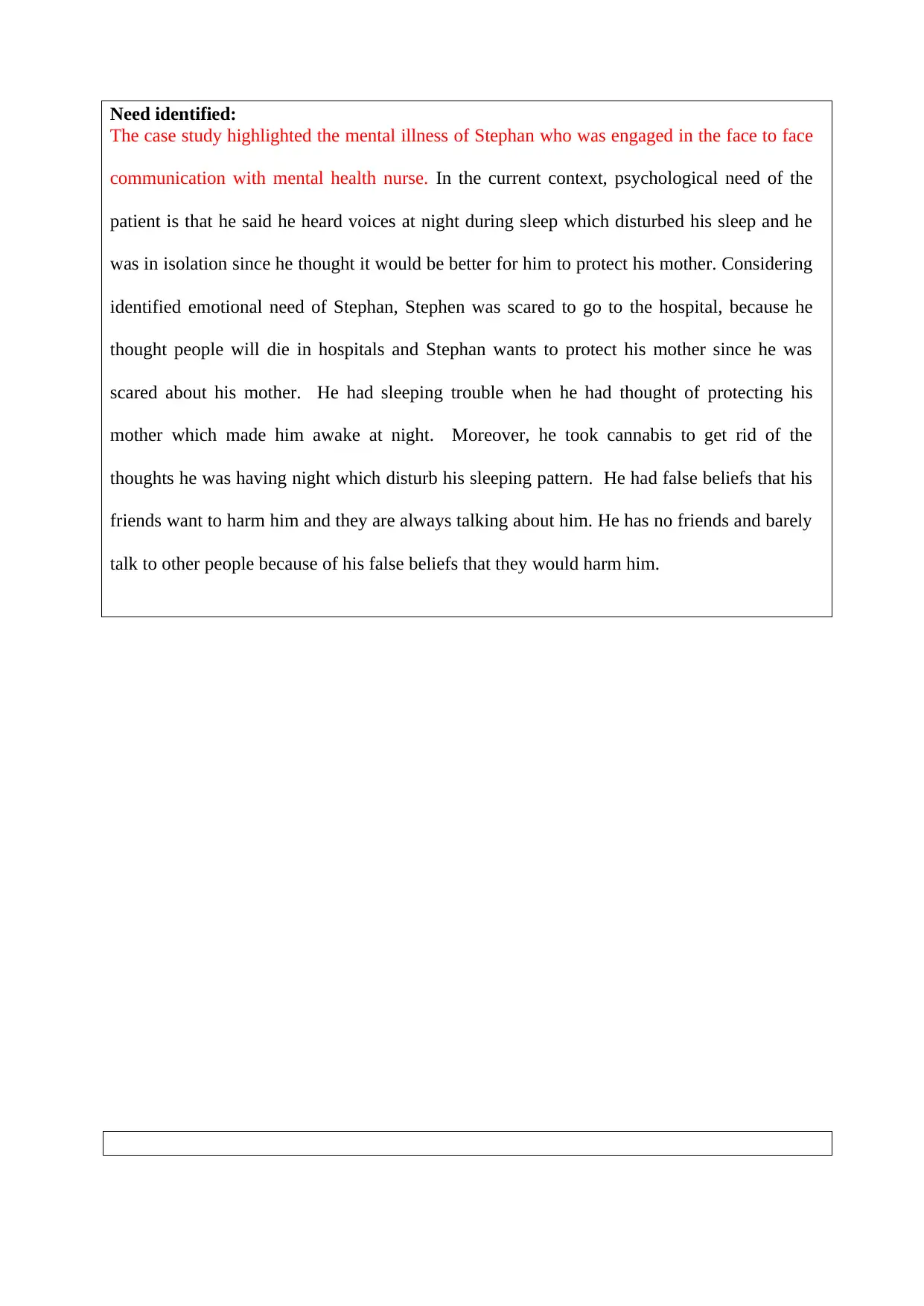
Need identified:
The case study highlighted the mental illness of Stephan who was engaged in the face to face
communication with mental health nurse. In the current context, psychological need of the
patient is that he said he heard voices at night during sleep which disturbed his sleep and he
was in isolation since he thought it would be better for him to protect his mother. Considering
identified emotional need of Stephan, Stephen was scared to go to the hospital, because he
thought people will die in hospitals and Stephan wants to protect his mother since he was
scared about his mother. He had sleeping trouble when he had thought of protecting his
mother which made him awake at night. Moreover, he took cannabis to get rid of the
thoughts he was having night which disturb his sleeping pattern. He had false beliefs that his
friends want to harm him and they are always talking about him. He has no friends and barely
talk to other people because of his false beliefs that they would harm him.
The case study highlighted the mental illness of Stephan who was engaged in the face to face
communication with mental health nurse. In the current context, psychological need of the
patient is that he said he heard voices at night during sleep which disturbed his sleep and he
was in isolation since he thought it would be better for him to protect his mother. Considering
identified emotional need of Stephan, Stephen was scared to go to the hospital, because he
thought people will die in hospitals and Stephan wants to protect his mother since he was
scared about his mother. He had sleeping trouble when he had thought of protecting his
mother which made him awake at night. Moreover, he took cannabis to get rid of the
thoughts he was having night which disturb his sleeping pattern. He had false beliefs that his
friends want to harm him and they are always talking about him. He has no friends and barely
talk to other people because of his false beliefs that they would harm him.
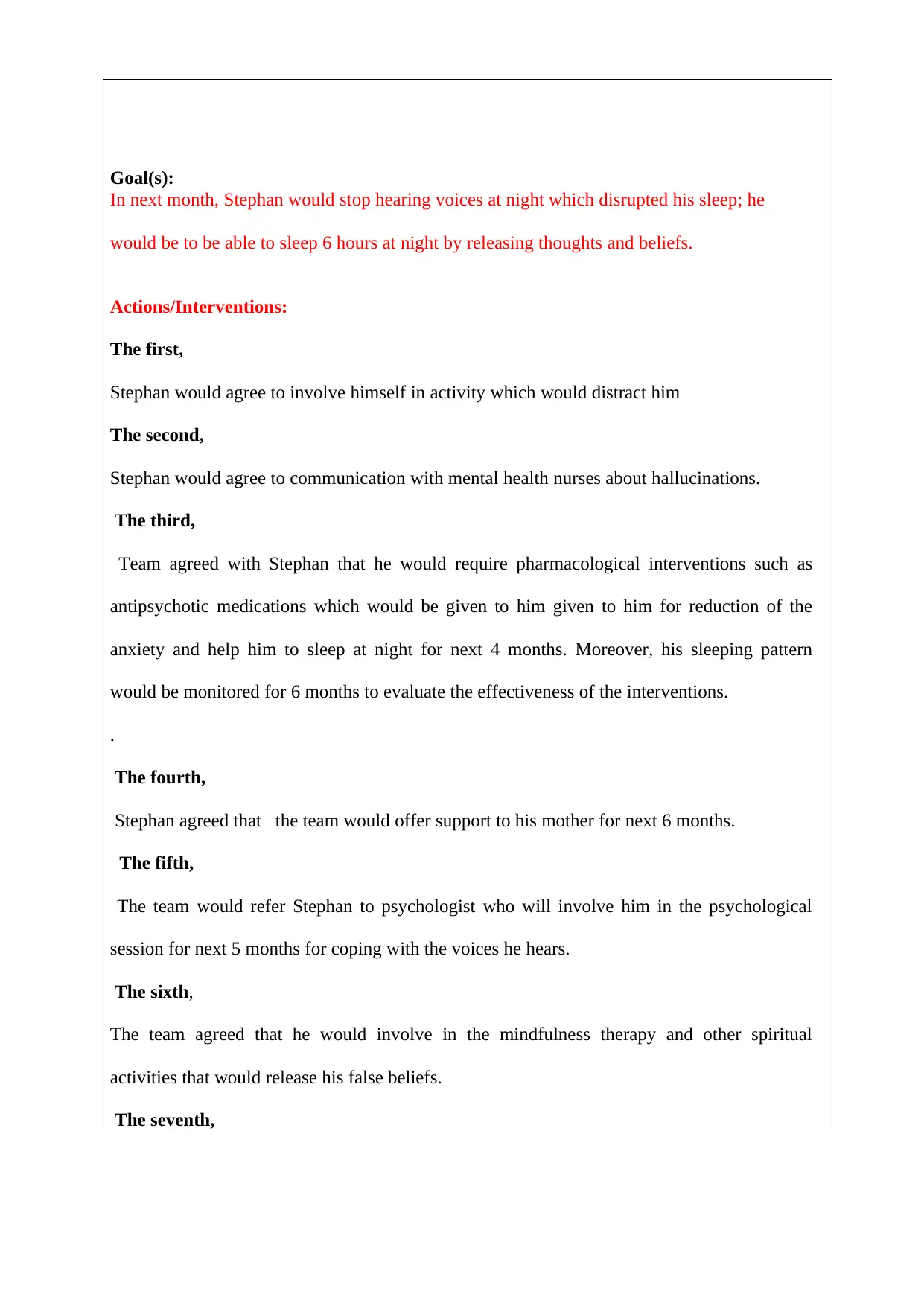
Goal(s):
In next month, Stephan would stop hearing voices at night which disrupted his sleep; he
would be to be able to sleep 6 hours at night by releasing thoughts and beliefs.
Actions/Interventions:
The first,
Stephan would agree to involve himself in activity which would distract him
The second,
Stephan would agree to communication with mental health nurses about hallucinations.
The third,
Team agreed with Stephan that he would require pharmacological interventions such as
antipsychotic medications which would be given to him given to him for reduction of the
anxiety and help him to sleep at night for next 4 months. Moreover, his sleeping pattern
would be monitored for 6 months to evaluate the effectiveness of the interventions.
.
The fourth,
Stephan agreed that the team would offer support to his mother for next 6 months.
The fifth,
The team would refer Stephan to psychologist who will involve him in the psychological
session for next 5 months for coping with the voices he hears.
The sixth,
The team agreed that he would involve in the mindfulness therapy and other spiritual
activities that would release his false beliefs.
The seventh,
In next month, Stephan would stop hearing voices at night which disrupted his sleep; he
would be to be able to sleep 6 hours at night by releasing thoughts and beliefs.
Actions/Interventions:
The first,
Stephan would agree to involve himself in activity which would distract him
The second,
Stephan would agree to communication with mental health nurses about hallucinations.
The third,
Team agreed with Stephan that he would require pharmacological interventions such as
antipsychotic medications which would be given to him given to him for reduction of the
anxiety and help him to sleep at night for next 4 months. Moreover, his sleeping pattern
would be monitored for 6 months to evaluate the effectiveness of the interventions.
.
The fourth,
Stephan agreed that the team would offer support to his mother for next 6 months.
The fifth,
The team would refer Stephan to psychologist who will involve him in the psychological
session for next 5 months for coping with the voices he hears.
The sixth,
The team agreed that he would involve in the mindfulness therapy and other spiritual
activities that would release his false beliefs.
The seventh,
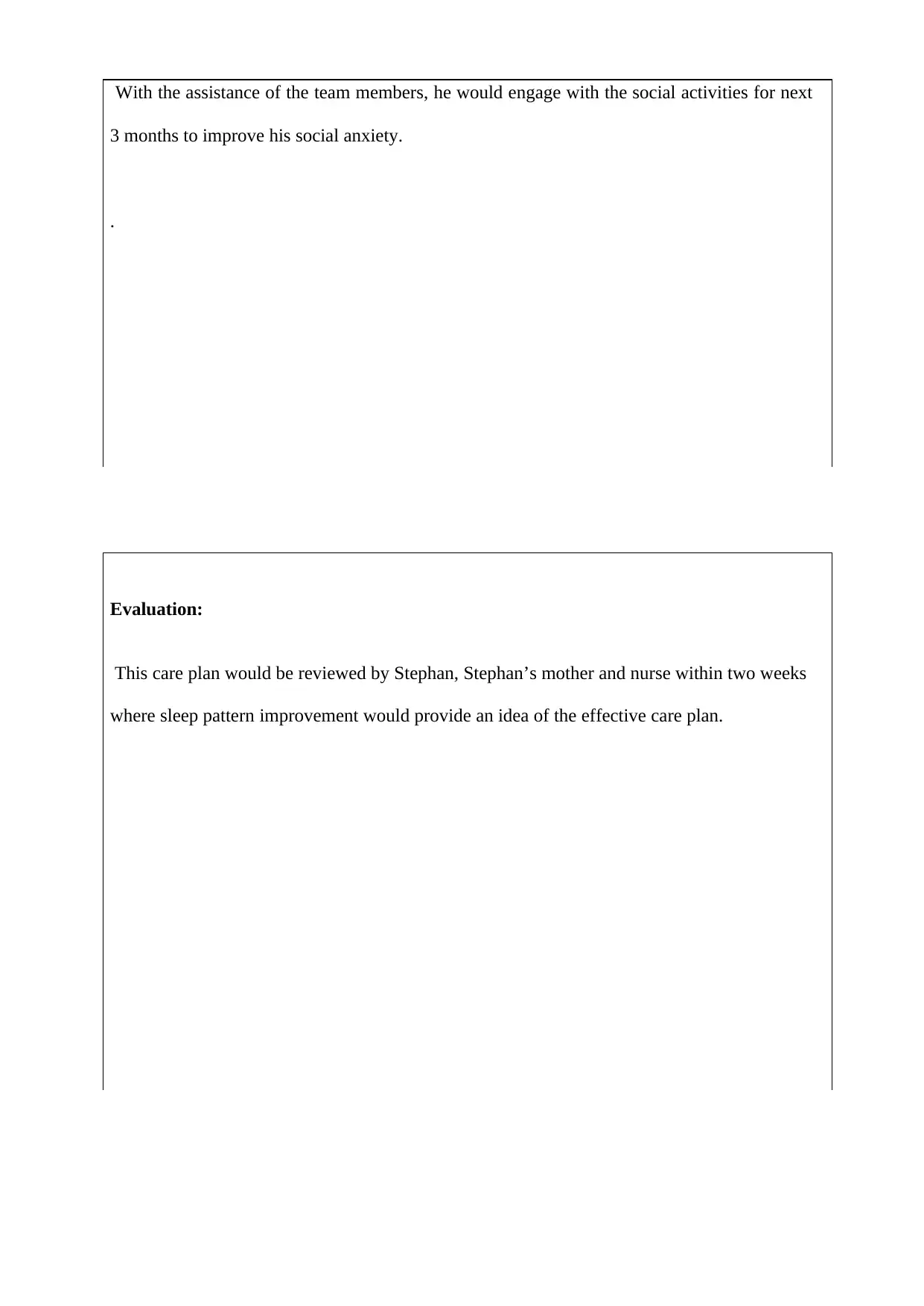
With the assistance of the team members, he would engage with the social activities for next
3 months to improve his social anxiety.
.
Evaluation:
This care plan would be reviewed by Stephan, Stephan’s mother and nurse within two weeks
where sleep pattern improvement would provide an idea of the effective care plan.
3 months to improve his social anxiety.
.
Evaluation:
This care plan would be reviewed by Stephan, Stephan’s mother and nurse within two weeks
where sleep pattern improvement would provide an idea of the effective care plan.
Secure Best Marks with AI Grader
Need help grading? Try our AI Grader for instant feedback on your assignments.
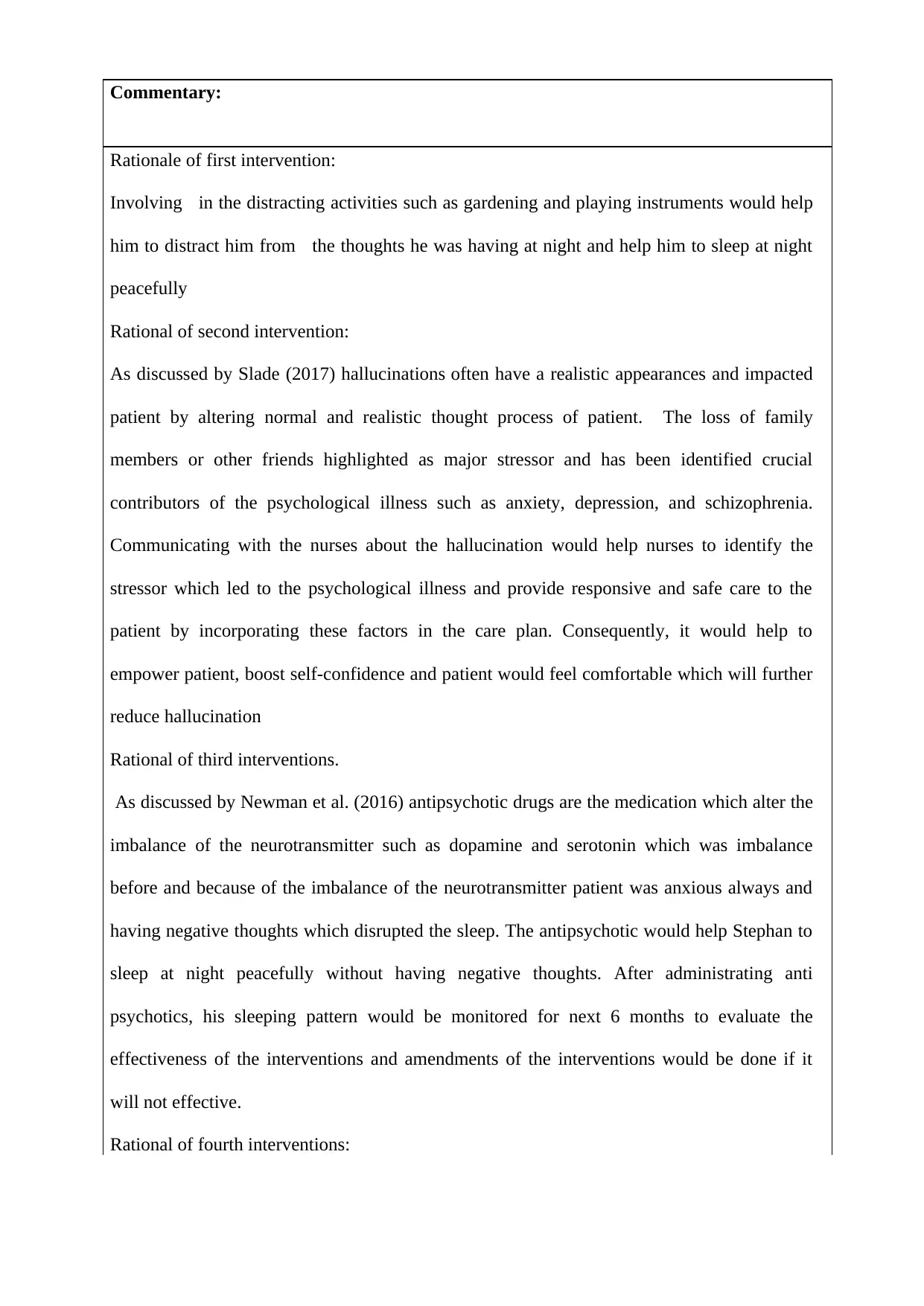
Commentary:
Rationale of first intervention:
Involving in the distracting activities such as gardening and playing instruments would help
him to distract him from the thoughts he was having at night and help him to sleep at night
peacefully
Rational of second intervention:
As discussed by Slade (2017) hallucinations often have a realistic appearances and impacted
patient by altering normal and realistic thought process of patient. The loss of family
members or other friends highlighted as major stressor and has been identified crucial
contributors of the psychological illness such as anxiety, depression, and schizophrenia.
Communicating with the nurses about the hallucination would help nurses to identify the
stressor which led to the psychological illness and provide responsive and safe care to the
patient by incorporating these factors in the care plan. Consequently, it would help to
empower patient, boost self-confidence and patient would feel comfortable which will further
reduce hallucination
Rational of third interventions.
As discussed by Newman et al. (2016) antipsychotic drugs are the medication which alter the
imbalance of the neurotransmitter such as dopamine and serotonin which was imbalance
before and because of the imbalance of the neurotransmitter patient was anxious always and
having negative thoughts which disrupted the sleep. The antipsychotic would help Stephan to
sleep at night peacefully without having negative thoughts. After administrating anti
psychotics, his sleeping pattern would be monitored for next 6 months to evaluate the
effectiveness of the interventions and amendments of the interventions would be done if it
will not effective.
Rational of fourth interventions:
Rationale of first intervention:
Involving in the distracting activities such as gardening and playing instruments would help
him to distract him from the thoughts he was having at night and help him to sleep at night
peacefully
Rational of second intervention:
As discussed by Slade (2017) hallucinations often have a realistic appearances and impacted
patient by altering normal and realistic thought process of patient. The loss of family
members or other friends highlighted as major stressor and has been identified crucial
contributors of the psychological illness such as anxiety, depression, and schizophrenia.
Communicating with the nurses about the hallucination would help nurses to identify the
stressor which led to the psychological illness and provide responsive and safe care to the
patient by incorporating these factors in the care plan. Consequently, it would help to
empower patient, boost self-confidence and patient would feel comfortable which will further
reduce hallucination
Rational of third interventions.
As discussed by Newman et al. (2016) antipsychotic drugs are the medication which alter the
imbalance of the neurotransmitter such as dopamine and serotonin which was imbalance
before and because of the imbalance of the neurotransmitter patient was anxious always and
having negative thoughts which disrupted the sleep. The antipsychotic would help Stephan to
sleep at night peacefully without having negative thoughts. After administrating anti
psychotics, his sleeping pattern would be monitored for next 6 months to evaluate the
effectiveness of the interventions and amendments of the interventions would be done if it
will not effective.
Rational of fourth interventions:
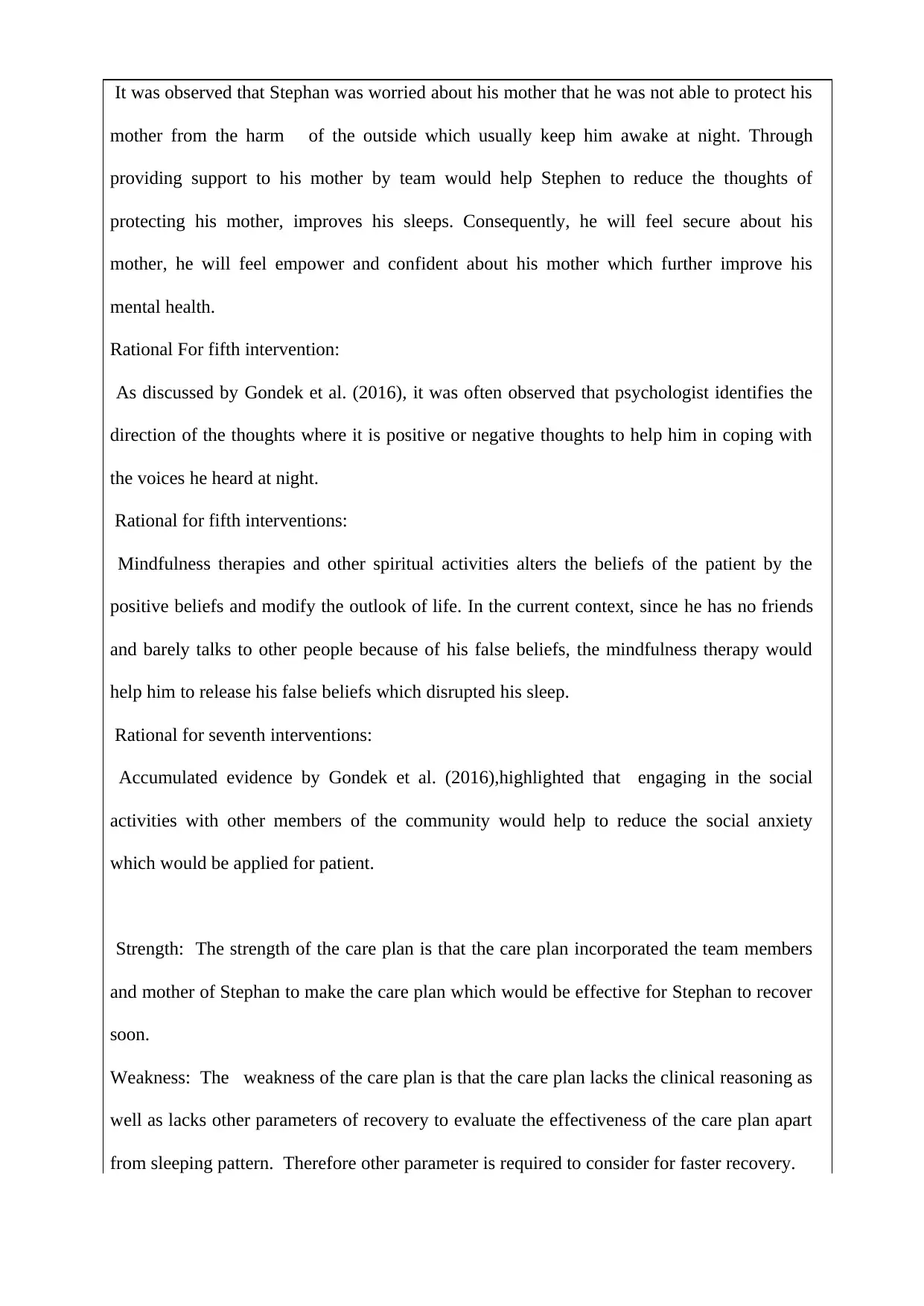
It was observed that Stephan was worried about his mother that he was not able to protect his
mother from the harm of the outside which usually keep him awake at night. Through
providing support to his mother by team would help Stephen to reduce the thoughts of
protecting his mother, improves his sleeps. Consequently, he will feel secure about his
mother, he will feel empower and confident about his mother which further improve his
mental health.
Rational For fifth intervention:
As discussed by Gondek et al. (2016), it was often observed that psychologist identifies the
direction of the thoughts where it is positive or negative thoughts to help him in coping with
the voices he heard at night.
Rational for fifth interventions:
Mindfulness therapies and other spiritual activities alters the beliefs of the patient by the
positive beliefs and modify the outlook of life. In the current context, since he has no friends
and barely talks to other people because of his false beliefs, the mindfulness therapy would
help him to release his false beliefs which disrupted his sleep.
Rational for seventh interventions:
Accumulated evidence by Gondek et al. (2016),highlighted that engaging in the social
activities with other members of the community would help to reduce the social anxiety
which would be applied for patient.
Strength: The strength of the care plan is that the care plan incorporated the team members
and mother of Stephan to make the care plan which would be effective for Stephan to recover
soon.
Weakness: The weakness of the care plan is that the care plan lacks the clinical reasoning as
well as lacks other parameters of recovery to evaluate the effectiveness of the care plan apart
from sleeping pattern. Therefore other parameter is required to consider for faster recovery.
mother from the harm of the outside which usually keep him awake at night. Through
providing support to his mother by team would help Stephen to reduce the thoughts of
protecting his mother, improves his sleeps. Consequently, he will feel secure about his
mother, he will feel empower and confident about his mother which further improve his
mental health.
Rational For fifth intervention:
As discussed by Gondek et al. (2016), it was often observed that psychologist identifies the
direction of the thoughts where it is positive or negative thoughts to help him in coping with
the voices he heard at night.
Rational for fifth interventions:
Mindfulness therapies and other spiritual activities alters the beliefs of the patient by the
positive beliefs and modify the outlook of life. In the current context, since he has no friends
and barely talks to other people because of his false beliefs, the mindfulness therapy would
help him to release his false beliefs which disrupted his sleep.
Rational for seventh interventions:
Accumulated evidence by Gondek et al. (2016),highlighted that engaging in the social
activities with other members of the community would help to reduce the social anxiety
which would be applied for patient.
Strength: The strength of the care plan is that the care plan incorporated the team members
and mother of Stephan to make the care plan which would be effective for Stephan to recover
soon.
Weakness: The weakness of the care plan is that the care plan lacks the clinical reasoning as
well as lacks other parameters of recovery to evaluate the effectiveness of the care plan apart
from sleeping pattern. Therefore other parameter is required to consider for faster recovery.
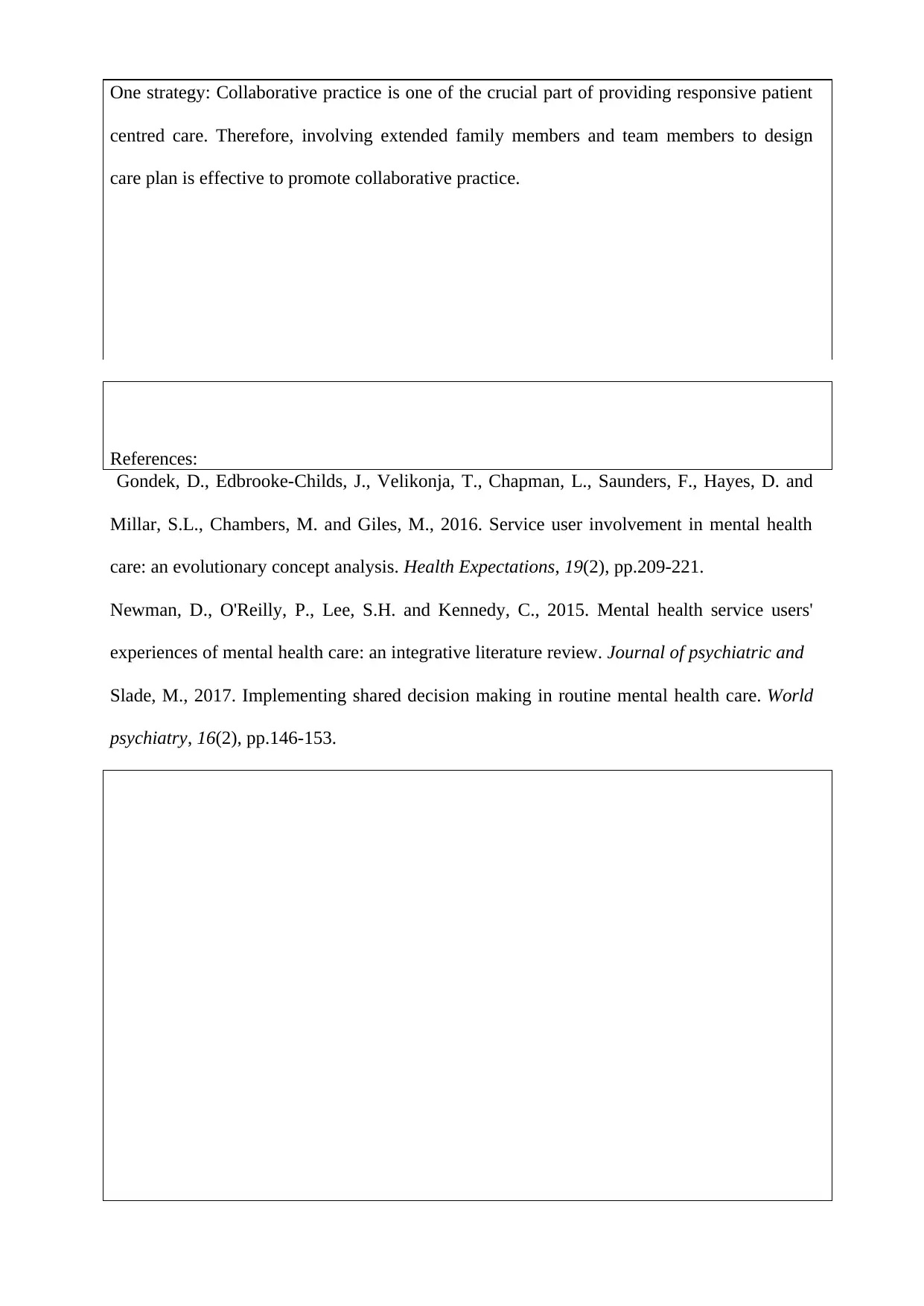
One strategy: Collaborative practice is one of the crucial part of providing responsive patient
centred care. Therefore, involving extended family members and team members to design
care plan is effective to promote collaborative practice.
References:
Gondek, D., Edbrooke‐Childs, J., Velikonja, T., Chapman, L., Saunders, F., Hayes, D. and
Millar, S.L., Chambers, M. and Giles, M., 2016. Service user involvement in mental health
care: an evolutionary concept analysis. Health Expectations, 19(2), pp.209-221.
Newman, D., O'Reilly, P., Lee, S.H. and Kennedy, C., 2015. Mental health service users'
experiences of mental health care: an integrative literature review. Journal of psychiatric and
Slade, M., 2017. Implementing shared decision making in routine mental health care. World
psychiatry, 16(2), pp.146-153.
centred care. Therefore, involving extended family members and team members to design
care plan is effective to promote collaborative practice.
References:
Gondek, D., Edbrooke‐Childs, J., Velikonja, T., Chapman, L., Saunders, F., Hayes, D. and
Millar, S.L., Chambers, M. and Giles, M., 2016. Service user involvement in mental health
care: an evolutionary concept analysis. Health Expectations, 19(2), pp.209-221.
Newman, D., O'Reilly, P., Lee, S.H. and Kennedy, C., 2015. Mental health service users'
experiences of mental health care: an integrative literature review. Journal of psychiatric and
Slade, M., 2017. Implementing shared decision making in routine mental health care. World
psychiatry, 16(2), pp.146-153.
Paraphrase This Document
Need a fresh take? Get an instant paraphrase of this document with our AI Paraphraser

1 out of 8
Related Documents
Your All-in-One AI-Powered Toolkit for Academic Success.
+13062052269
info@desklib.com
Available 24*7 on WhatsApp / Email
![[object Object]](/_next/static/media/star-bottom.7253800d.svg)
Unlock your academic potential
© 2024 | Zucol Services PVT LTD | All rights reserved.



